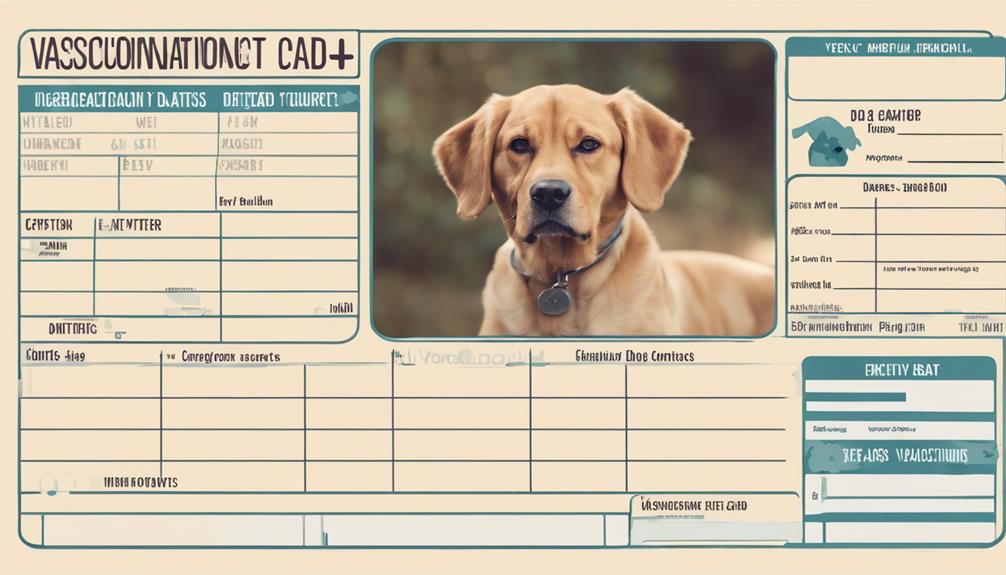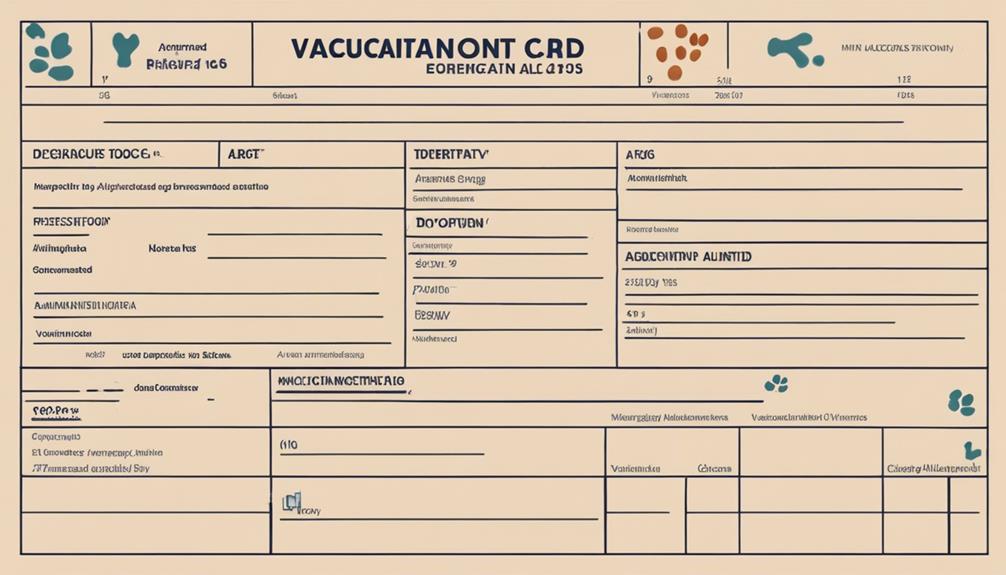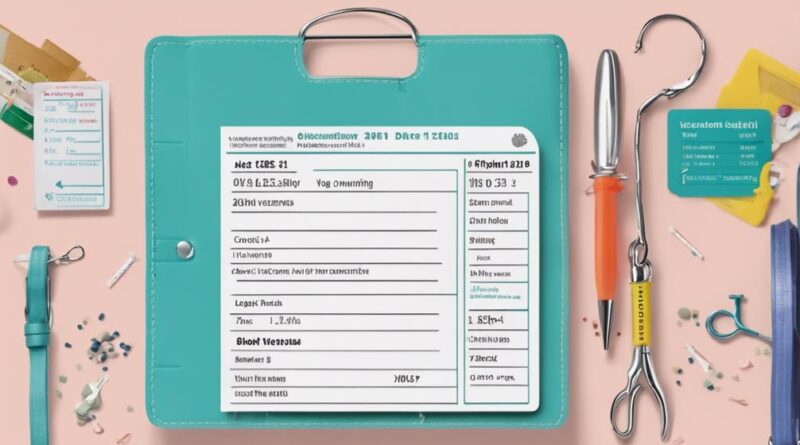12 Essential Tips for Your Dog's Vaccination Card
Maintain your dog's vaccination card effectively. Review expiry dates regularly. Store it in a waterproof container and keep a digital backup. Don't forget to include their microchip info. Update records consistently and know your state requirements. Keep the card in your emergency kit, noting any allergies. Store it visibly for easy access. Share with your pet sitter and discuss with your vet regularly. These 12 essential tips ensure your pet's health and safety. Each tip plays a vital role in effective management.
Check Vaccination Expiry Dates
Make sure to regularly review the expiry dates on your dog's vaccination card to ensure their protection remains current. Checking your pet's vaccination records is crucial in maintaining their health and safeguarding them against various diseases. By staying vigilant and scheduling appointments for vaccinations before they expire, you're actively taking steps to keep your furry friend healthy and happy.
Keeping track of your dog's vaccination dates is essential for their well-being. Mark your calendar or set reminders on your phone to ensure you never miss an important vaccination appointment. By staying organized and proactive, you can provide your dog with the necessary protection they need to thrive.
Missing a vaccination appointment can leave your dog vulnerable to preventable illnesses. Make it a priority to regularly check your dog's vaccination records and schedule appointments with your veterinarian in advance. This simple routine can make a significant difference in your pet's overall health and longevity.
Store in Waterproof Container
Ensure the longevity of your dog's vaccination card by storing it in a waterproof container to protect it from potential damage or loss. This simple step can safeguard your pet's important medical records, ensuring they remain intact and legible when you need them the most.
When it comes to storing your dog's vaccination card in a waterproof container, here are some key benefits and tips to consider:
- Waterproof protection: Shielding your dog's vaccination card from moisture is crucial to prevent smudging or illegible information, especially in case of accidental spills or rainy weather.
- Durability: Opt for a sturdy, waterproof container that can withstand various environmental conditions, ensuring the card stays safe and intact over time.
- Emergency preparedness: Having a waterproof container for your dog's vaccination card is part of being prepared for emergencies. In case of evacuation or sudden travel, you can quickly grab the container without worrying about damage.
- Easy access: Keep the waterproof container in a designated and easily accessible spot at home. This way, you can swiftly grab it when visiting the vet or during any pet-related emergencies.
Keep a Digital Backup
Consider creating a digital backup of your dog's vaccination card to ensure easy access and safekeeping of important medical records. One effective way to do this is by utilizing cloud storage services. By scanning or taking a clear photo of your dog's vaccination card and uploading it to a cloud storage platform like Google Drive, Dropbox, or iCloud, you can have a duplicate copy that can be accessed anytime, anywhere. This ensures that even if the physical card is lost or damaged, you still have a reliable digital copy.
When storing your dog's vaccination card digitally, remember to enable password protection for an added layer of security. This will prevent unauthorized access and keep the sensitive medical information safe. Choose a strong, unique password and consider using two-factor authentication if the option is available. By taking these precautions, you can ensure that only you or trusted individuals can view and manage the digital backup.
Cloud storage not only offers secure access to your dog's vaccination records but also allows for easy sharing with veterinarians or pet care providers when needed. Additionally, in case your device is lost or malfunctions, having a digital backup ensures that the information isn't lost forever. Make it a habit to update the digital copy whenever new vaccinations are administered to keep the records current and accurate.
Include Microchip Information
Incorporate your dog's microchip details into the vaccination card for comprehensive identification and tracking purposes. Microchips offer numerous benefits for your pet's safety and security. When updating your dog's vaccination card, ensure to include the microchip information for added protection.
- Microchip Benefits
- Microchips provide a permanent form of identification for your dog.
- They can help reunite you with your pet if they ever get lost.
- Microchipping is a quick and relatively painless procedure that can bring peace of mind.
- It's a reliable way to prove ownership of your furry companion in case of disputes.
Remember to register your dog's microchip with your contact details. This step is crucial in ensuring that if your pet goes missing, they can be identified and returned to you promptly.
Incorporating the microchip information into your dog's vaccination card enhances the overall safety measures you have in place for your pet. By keeping this information up to date and easily accessible, you're taking proactive steps to safeguard your dog's well-being.
Regularly Update Information
Updating your dog's vaccination card with current information is a proactive step in maintaining accurate records for your pet's health and safety. To ensure the effectiveness of the vaccination card, it's crucial to update it regularly. By keeping the information on the card current, you're helping to maintain accuracy in your dog's medical history and vaccination status.
Regular updates to your dog's vaccination card are essential for several reasons. Firstly, it allows you to track when your pet received specific vaccinations, making it easier to schedule booster shots when necessary. Additionally, accurate information on the card can be vital in case of emergencies or when boarding your dog at a kennel. It ensures that caregivers have access to the most up-to-date details regarding your dog's health needs.
To maintain accuracy on your dog's vaccination card, make it a habit to update it every time your pet receives a new vaccination or medical treatment. Include the date of the procedure, the type of vaccine or treatment administered, and the veterinarian's contact information. Regularly reviewing and updating this information will help you stay organized and prepared for any situation that may arise concerning your dog's health. Remember, a current and accurate vaccination card is a valuable asset in safeguarding your furry friend's well-being.
Keep With Travel Essentials
Ensure that your dog's vaccination card is always kept with your travel essentials for easy access and peace of mind during trips. When it comes to travel preparations and packing, having your dog's vaccination card on hand is crucial. Here are some key reasons why you should include it with your travel essentials:
- Emergency Situations: In case of any unforeseen emergencies during your trip, having your dog's vaccination card readily available can provide important information to veterinarians or authorities.
- Border Crossings: When traveling internationally or crossing state borders, some places may require proof of your dog's vaccinations. Keeping the card handy will ease the process.
- Accommodation Requirements: Certain hotels, airlines, or pet-friendly accommodations may ask for vaccination records. Having the card with you ensures a smooth check-in experience.
- Health and Safety: From unexpected illnesses to accidents, having your dog's vaccination information easily accessible can assist in providing the necessary care promptly.
For efficient document organization and storage, consider getting a protective sleeve or a waterproof case to safeguard the card while traveling. By integrating your dog's vaccination card into your travel essentials, you prioritize your pet's well-being and streamline any potential administrative requirements that may arise during your journey.
Share With Pet Sitter

Consider sharing your dog's vaccination card with the pet sitter to ensure they've important information readily available in case of emergencies or inquiries. Providing your pet sitter with access to your dog's vaccination card can be crucial in case of unexpected situations. In emergencies, having immediate access to your dog's vaccination history can assist the sitter in making informed decisions regarding your dog's health.
Additionally, sharing your dog's vaccination card with the pet sitter allows you to provide them with essential details such as emergency contacts and your dog's daily routine. In case of an emergency, the pet sitter can quickly reach out to the designated emergency contact listed on the card. This can expedite decision-making processes and ensure that your dog receives prompt care when needed.
Moreover, sharing your dog's daily routine, which may be included in the vaccination card or provided separately, can help the pet sitter maintain continuity in your dog's schedule. This can be particularly comforting for your pet, as dogs thrive on routine and familiarity. By sharing this information, you're helping the pet sitter provide the best care possible for your beloved companion while you're away.
Discuss With Vet Regularly
To ensure your dog's health is consistently monitored and maintained, engage in regular discussions with your veterinarian regarding their care and vaccination needs. Your vet is a crucial partner in keeping your furry friend healthy and up-to-date on essential vaccinations.
Here are some key points to consider when discussing with your vet:
- Discuss Vaccination Schedule: Work with your vet to establish a vaccination schedule tailored to your dog's specific needs. Regular vaccinations are vital to prevent various diseases and promote overall well-being.
- Ask About Any Concerns: If you have any doubts or questions about your dog's vaccinations or health, don't hesitate to bring them up during your discussions with the vet. Clear communication is key.
- Follow-Up on Previous Vaccinations: Ensure that your dog's previous vaccinations are documented and that you receive reminders for upcoming booster shots or additional vaccines that may be necessary.
- Stay Informed About New Recommendations: Veterinary guidelines and recommendations may change over time. Stay informed about any new vaccines or protocols that could benefit your dog's health.
Regular communication with your vet will help you stay on top of your dog's vaccination needs and overall health, ensuring a happy and healthy life for your furry companion.
Know State Requirements

Stay informed about the vaccination requirements specific to your state to ensure your dog's compliance with local regulations and optimal health protection. State regulations regarding dog vaccinations can vary, so it's crucial to be aware of the specific mandates in your area.
Understanding your state's vaccination schedules will help you keep your dog up to date on all necessary shots, protecting them from preventable diseases. Failure to comply with state regulations can't only put your dog at risk but may also lead to legal consequences or restrictions on activities such as boarding or grooming services.
To ensure you're meeting your state's requirements, consult with your veterinarian who can provide guidance on which vaccinations are necessary and the appropriate schedule for your dog. Some states may have specific laws or recommendations regarding rabies vaccinations, which are essential for your dog's health and are often mandated by law.
Keep in Emergency Kit
Ensure your dog's safety and preparedness by including essential vaccination records in your emergency kit. In case of an emergency, having your dog's vaccination card readily available can provide vital information to emergency responders or veterinary professionals. Here are some key items to consider including in your emergency kit:
- First Aid Kit: A well-stocked first aid kit specifically designed for pets can be a lifesaver in emergencies. Include items such as bandages, gauze pads, antiseptic wipes, and tweezers to handle minor injuries until you can seek professional help.
- Pet Insurance Information: Keep a copy of your pet's insurance details in the emergency kit. In case your dog requires medical treatment during an emergency, having the insurance information readily available can help streamline the process and ensure your furry friend receives the necessary care without delays.
- Emergency Contact List: Include a list of emergency contacts, such as your regular veterinarian's number, the nearest 24-hour animal hospital, and a trusted friend or family member who can assist in case of an emergency when you're unavailable.
- Medication List: If your dog is on any medication, make sure to include a list of these medications in the emergency kit. This information can be crucial for medical professionals to provide appropriate care without any risk of drug interactions.
Include Allergies Information

Including allergies information for your dog in the emergency kit is essential for prompt and effective medical care during emergencies. In case of an allergic reaction or any other medical emergency, having this information readily available can help veterinarians make quick and informed decisions to provide the best care for your furry friend. Along with listing your dog's allergies, it's crucial to include emergency contact details and a list of any medications your dog is currently taking.
When listing your dog's allergies, be specific and detailed. Include common allergens such as certain foods, medications, or environmental triggers. This information will assist emergency responders or veterinarians in identifying and addressing potential allergic reactions promptly. Moreover, providing emergency contact information ensures that you can be reached quickly in case of an emergency, allowing you to make important decisions regarding your dog's care.
Additionally, listing all medications your dog is taking on the vaccination card is vital. Include the names of the medications, dosages, and frequency of administration. This information helps medical professionals avoid any potential drug interactions and ensures that your dog receives the appropriate treatment without complications. By including allergies information, emergency contacts, and a list of medications, you're taking proactive steps to safeguard your dog's health during unforeseen emergencies.
Keep in Visible Location
To ensure quick access during emergencies, place your dog's vaccination card in a visible location at all times. This simple step can make a significant difference in providing necessary information promptly.
Here are some essential tips to consider:
- Display prominently: Choose a spot in your home where the vaccination card will be easily seen. Avoid tucking it away in a drawer or leaving it in a pile of papers where it can get lost.
- Emergency contact: In case of an emergency, having your dog's vaccination card readily available with emergency contact information can be lifesaving. Make sure this crucial document isn't only visible but also easily accessible.
- Avoid direct sunlight: While it's important to display the card prominently, be mindful of where you place it. Direct sunlight can cause the ink to fade, making the information on the card illegible. Opt for a visible location that's also protected from excessive light exposure.
- Consider a backup: To ensure you always have access to your dog's vaccination information, consider making a digital copy as a backup. Store it securely on your phone or computer, but remember that a physical card is often required in emergencies.
Frequently Asked Questions
Can I Laminate My Dog's Vaccination Card?
You can laminate your dog's vaccination card, but there are pros and cons to consider. Laminating can protect the card from wear and tear, water damage, and fading, ensuring it lasts longer.
However, laminating may make it challenging to add new vaccine stickers or information, potentially causing damage if you try to remove the lamination. Be cautious and consider the potential drawbacks before making a decision.
Should I Include My Contact Information on the Card?
You should include your contact information on your dog's vaccination card. It's crucial in case your pet gets lost or needs emergency care.
However, be mindful of privacy concerns when sharing personal details. Ensure that only necessary information is included to protect your privacy and your pet's.
Having your contact information readily available can help ensure your dog's safety and well-being in any situation.
Is It Necessary to Keep a Copy at Home?
Keeping a copy of your dog's vaccination card at home is crucial. In emergency situations, having quick access to this information can be a lifesaver. Consider storing it in a safe place where it's easily retrievable.
Whether in a designated folder, on your phone, or scanned and saved digitally, having a backup ensures you're always prepared. Make sure to choose a storage option that works best for you and your furry friend's needs.
How Often Should I Update the Card?
To keep your dog's vaccination card up to date, follow the recommended vaccination schedule provided by your vet. Set up a reminder system, like calendar alerts, to ensure you don't miss any updates.
Keep the card organized in a safe place, such as a folder or plastic sleeve, to prevent loss or damage. Regularly review the card and update it as needed to maintain an accurate record of your dog's vaccinations.
Can I Use a Digital Vaccination Card Instead?
You can use a digital vaccination card instead of a paper one for your dog. Digital records offer convenience and accessibility, making it easier to store and access your pet's vaccination information.
However, ensure the digital platform is secure and reliable to prevent any data loss or privacy concerns. Consider the benefits of paper vs. digital options and choose the one that best suits your needs for keeping track of your dog's vaccinations.
Conclusion
In conclusion, keeping your dog's vaccination card organized and up-to-date is essential for their health and safety. By following these 12 essential tips, you can ensure that you're prepared for any situation that may arise.
Remember to regularly check expiration dates, store in a waterproof container, keep a digital backup, and update information as needed. By taking these simple steps, you can provide the best care for your furry friend.
